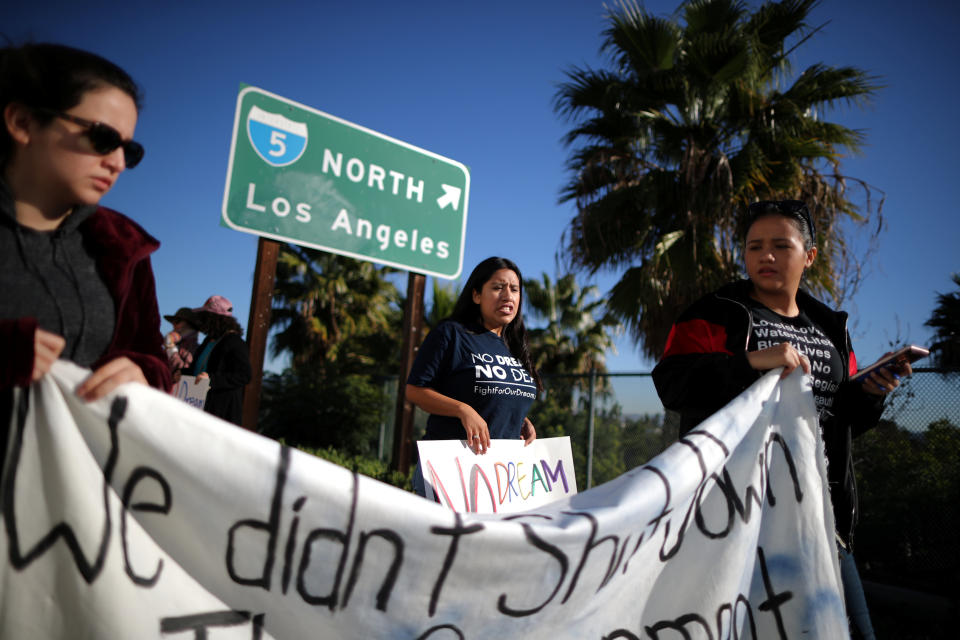'Dreamers' are good for the economy

A relatively small group of people is the focal point of a huge, mushrooming brawl in Washington, D.C. On the economic merits alone, there shouldn’t be any fuss at all.
Yet the government may shut down soon because Congress can’t decide what to do about the so-called “dreamers”—roughly 700,000 young people brought to the United States illegally as children, and raised here ever since. President Trump dismissed the dreamers in his recent State of the Union address, engaging in charged verbal wordplay by insisting that “Americans are dreamers, too.” He reiterated his demands for agreeing to let the dreamers stay: funding for his border wall, and policy changes meant to encourage more highly skilled immigrants and fewer family members. Congress could brawl over these issues for much of 2018.
Though born elsewhere, the dreamers essentially grew up in America, learning English, graduating from high school and then going to college or entering the workforce. They now range in age from 16 to 35. Last September, Trump ended a temporary Obama-era program known as Deferred Action for Childhood Arrivals, or DACA, that allowed dreamers to live and work undisturbed in the United States. Trump told Congress to come up with a more permanent plan by early March. If Congress doesn’t, the dreamers could face deportation.
If the dilemma over the dreamers were purely an economic matter, the solution would be obvious: keep them here. About 55% of the dreamers work, while many of the rest are students or stay-at-home caregivers. The dreamers contribute about $42 billion to the economy each year, on net, and generate about $3.4 billion in annual tax revenue for the government, according to the center-right American Action Forum, run by Douglas Holtz-Eakin, former head of the Congressional Budget Office. Those numbers account for costs dreamers impose on the system, such as the use of public schools and other government services, along with benefits they generate, such as revenue derived from sales and income taxes they pay.
Dreamers’ significant economic contribution
There are a lot of misleading numbers in circulation that falsely make the dreamers sounds like a net drag on American society. There are about 11 million undocumented migrants in the United States, and the anti-immigrant Center for Immigration Studies says that overall, they impose a “total lifetime fiscal drain” of $746 billion on U.S. taxpayers. Sounds costly.
But that number doesn’t include any economic contribution, such as taxes paid or demand generated by goods and services such people purchase. Nor does it account for the decline in the size of the labor force that would occur if undocumented migrants were suddenly gone. A smaller labor force generally means lower economic growth.
Besides, dreamers account for less than 7% of the total undocumented population in the United States. And they’re probably more productive than the broader undocumented cohort, since the DACA program requires dreamers to have a high-school degree or equivalent and have a crime-free record.
Still, the problem remains: The dreamers are in the country in violation of U.S. law. The majority of Americans favor an outcome that lets the dreams stay in the United States. But there are legitimate concerns about giving one group of undocumented migrants amnesty, because that could create an incentive for others to migrate to the country illegally, hoping they’ll get a similar deal.
Among many in Congress, there’s an agreement in principle that tightening security along the southwest border would be a fair tradeoff for securing permanent legal status for the dreamers. But hard-liners on either side see it differently. Trump has said he’ll accept the dreamers in exchange for a full $25 billion in funding for the big wall he wants to build along the southwest border. Democrats oppose Trump’s wall and accuse him of holding the dreamers hostage to a white-whale obsession with anti-immigrant symbology. The divide between the extremes may be unbridgeable. That’s how deals die in Washington.
The economy won’t collapse if the United States loses the dreamers. But it won’t prosper, either, if the government turns hostile to productive workers contributing to the economy. Or if politicians put ideological concerns over economic ones.
Confidential tip line: [email protected]. Encrypted communication available.
Read more:
Rick Newman is the author of four books, including Rebounders: How Winners Pivot from Setback to Success. Follow him on Twitter: @rickjnewman
Follow Yahoo Finance on Facebook, Twitter, Instagram, and LinkedIn
